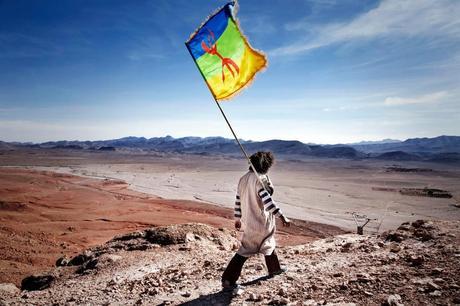from Climate Connections

An activist with the Berber flag. Protesters have occupied a hilltop above a silver mine for more than two years. Photo: Leila Alaoui for The New York Times
A Jan. 23 profile in the New York Times put a rare spotlight on the ongoing occupation camp established by Berber villagers at Mount Alebban, 5,000 feet high in the Atlas Mountains of Morocco, to protest the operations of the Imiter Mettalurgic Mining Company—whose principal owner is the North African nation’s King Mohammed VI.
The occupation was first launched in 1996, but broken up by the authorities. It was revived in the summer of 2011, after students from the local village of Imider, who were used to getting seasonal jobs at the mine, were turned down. That led the villagers—even those with jobs at the complex—to again establish a permanent encampment blocking access to the site of Africa’s most productive silver mine.
A key grievance is the mine’s use of local water sources, which is making agriculture in the arid region increasingly untenable. Protesters closed a pipe valve, cutting off the water supply to the mine. Since then, the mine’s output has plummeted—40% in 2012 and a further 30% in 2013. But Imider farmers say their long-drying wells are starting to replenish, and their shriveled orchards are again starting to bear fruit.
In addition to protection of local waters, villagers are demanding that 75% of the jobs at the mine be allocated to their municipality. But more general demands for Berber cultural rights and dignity also animate the protest, with the Berber flag flying above the encampment.
A 2011 constitutional reform, the fruit of a protest movement inspired by those across the Arab world, granted greater cultural rights to the Berbers who (by language) constitute nearly half Morocco’s population. But the Berbers remain disproportionately affected by poverty and marginalization. The area around Mount Alebban is among the poorest zones of Morocco.
The Imider protesters say they are willing to talk, but neither the government nor the mining company have come to the table, apparently opting for a strategy of waiting the movement out. (Ethical Consumer, Jan. 28; Yabiladi, Jan. 27; Reuters, Feb. 20, 2012)

